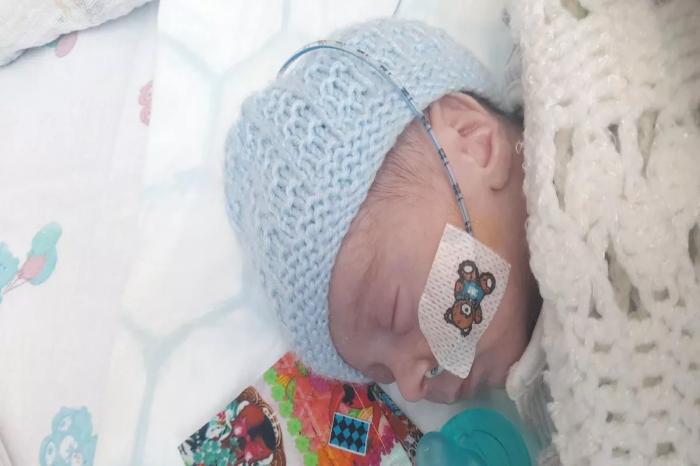A mother’s desperate attempts to save her newborn daughter’s life were tragically unsuccessful after she spent seven minutes trying to reach emergency services. The heartbreaking incident occurred after the baby went into a prolonged cardiac arrest, and the delay in getting through to emergency responders has left the family devastated.
Mother’s Desperate Plea for Help
In the early hours of September 30, 2022, 22-year-old Amelia Pill faced every parent‘s worst nightmare when her three-day-old daughter, Wyllow-Raine Swinburn, collapsed at home. Amelia immediately dialed 999, but her call for help went unanswered for over seven minutes as she anxiously tried to connect with emergency services. Her panic and frustration escalated as the minutes ticked by, prompting her to shout in distress, “Why aren’t they answering the f**king phone?”
Despite the mother’s repeated attempts to get through, the ambulance service did not respond to her call for an extended period, exacerbating an already dire situation. The tragic events unfolded in their home, just hours after Wyllow-Raine had been discharged from John Radcliffe Hospital.
Baby’s Collapse and Family’s Efforts
Wyllow-Raine was born on September 27, 2022, at John Radcliffe Hospital, and had been deemed healthy enough to be sent home with her family two days later. However, just hours after being home, she collapsed in the early morning of September 30, appearing to stop breathing. The family immediately sprang into action, with Wyllow-Raine’s mother dialing 999 and other family members, including her grandmother, Anna Fisher, rushing to assist.
In the meantime, the family performed CPR on the baby as they waited anxiously for paramedics to arrive. Amelia’s brother was woken up by her anguished cries for help as she shouted: “No one is coming! No one is coming!” The delay in response time added to the sense of helplessness as the family fought to save the infant’s life.
Long Wait for Ambulance
Despite the family’s desperate efforts to keep Wyllow-Raine alive, an ambulance did not arrive at their Oxford home until 5:09 a.m., more than 30 minutes after the initial call for help was placed at 4:38 a.m. By the time the paramedics arrived, the baby had been in cardiac arrest for an extended period. She was quickly transported to John Radcliffe Hospital, where she was pronounced dead shortly after arrival.
The harrowing wait for the ambulance, coupled with the prolonged period of cardiac arrest, left the family grieving not only the loss of their child but also the feeling that a crucial window of opportunity to save her life had passed.
Investigation and Cause of Death
Following Wyllow-Raine’s death, a post-mortem examination was conducted to determine whether any underlying medical conditions contributed to the tragedy. Paediatric pathologist Dr. Darren Farrell revealed that the baby did not suffer from any abnormalities or rare conditions that could have explained her sudden collapse. As a result, her death was classified as a case of “sudden unexpected death in infancy,” which remains unexplained.
The Oxford University NHS Foundation Trust launched an internal investigation in response to the events leading to Wyllow-Raine’s death. The investigation sought to determine whether the delay in the 999 call being answered and the subsequent arrival of the ambulance had a direct impact on the outcome. However, the investigation concluded that Wyllow-Raine had already been in a prolonged period of cardiac arrest before the 999 call was placed. Therefore, the overall outcome was deemed “not likely to be influenced by the time taken to answer the 999 call or the arrival of the ambulance.”
Coroner’s Inquest and Ongoing Review
In 2023, an inquest into Wyllow-Raine’s death was held at Oxford Coroner’s Court, overseen by Senior Coroner Darren Salter. During the inquest, further details of the emergency call delay and the family’s experience were presented. The inquest was initially adjourned to allow more time for gathering evidence regarding the circumstances of the incident.
A pre-inquest review (PIR) took place on October 2, 2023, as reported by The Sun, with further examination of the facts surrounding the baby’s death. This included evaluating the timeline of events, the 999 response delay, and the eventual arrival of paramedics. The review aims to provide clarity on whether systemic issues within the ambulance service contributed to the tragedy and whether any recommendations for improving emergency response times can be made.
A Family’s Heartbreak and Public Concern
For Amelia Pill and her family, the grief of losing their newborn daughter has been compounded by the frustrations surrounding the delayed emergency response. The emotional impact of knowing they did everything they could to save Wyllow-Raine, only to be let down by a critical delay, is something the family will carry with them.
The case has raised wider concerns about the efficiency of the emergency response system in the UK, particularly regarding the time it takes for 999 calls to be answered in life-or-death situations. In recent years, pressure on the National Health Service (NHS) has intensified, with growing demand on emergency services leading to delays in ambulance response times in certain areas.
The tragedy of Wyllow-Raine’s death serves as a stark reminder of the potential consequences of these delays and underscores the need for continued improvements in emergency service protocols.
Conclusion
The death of three-day-old Wyllow-Raine Swinburn after a prolonged cardiac arrest and a delayed emergency response is a heartbreaking incident that highlights the critical importance of timely intervention in medical emergencies. Despite the internal investigation’s conclusion that the outcome was unlikely to be affected by the delay, the family remains devastated by the loss and the tragic circumstances under which it occurred. As the inquest continues, the hope is that lessons will be learned to prevent similar tragedies in the future and to ensure that families in crisis receive the immediate help they desperately need.
Related topics:


